- Home
- Matthew Pearl
The Last Dickens Page 2
The Last Dickens Read online
Page 2
The German wharfinger became red in the face. “If you do not leave my wharf, I shall send for the police.”
Molasses kicked violently at the barrel until it was in pieces. Then he cried out a warning to the wharfinger in German. This time, the wharfinger backed away.
“Whiskey Bill? Was it him?” asked Molasses, turning back to Esquire.
“Nay, lasses,” Esquire answered grandly, raising himself onto the top of a bench, his feet dangling as he looked out at the water. “Bill didn't get sent on this mission.” A light breeze now played against the bay and the heavy sun illuminated the sailboats. In the distance, they could hear a bad snarl of traffic, the shouts of drivers, and whipping of horses, by Quincy Market.
Molasses, cleaning his reeking hands on his coat and pants, suddenly paused. “There was a whaler of a fellow following the young man-browned skin, lantern jaw, with a turbaned head. You think one of the bigwigs put him on the bounty, too, “squire?”
“Oh, I seen him earlier,” replied Esquire eerily. “His eyes big and black, like they were all hollow, and his mouth just like a skeleton's? No, he wasn't one of our kind, Molasses, that's sure. Not a man bent on dollars and dimes.”
JUST ABOUT THAT TIME in the middle of Dock Square, the omnibus called the “Alice Gray” rolled to a lumbering stop. Its driver and passengers dismounted to learn the source of the noise-that long blood-chilling crack they had all heard from below the vehicle a moment before.
“Good God!” “Why, he must've just been dragged!” “Crushed flat!” “Git the ladies away from here, will you?”
Below the back wheel, a pale young man in a torn wool suit. The first wheel had passed over his neck and the next over his leg, nearly severing it below the knee.
One of the gentlemen coming out of the bus was the first at the body. The young man's head jerked slightly. His pupils contracted and his mouth opened. “He's alive!” someone shouted. “Is there a doctor?”
“I am lawyer,” said the gentleman as if to improve on the question by answering a different one. “Sylvanus Bendall, attorney-at-law!” The dying man reached to grab this lawyer's collar with surprising insistence, as his mouth formed a word, then another. Bendall listened carefully, and then the lad's strength seemed to fail and he stopped.
After a few moments of sober examination befitting an actual doctor, the kneeling man who called himself Bendall removed his hat to signal the young man's death. A tall gentleman pointed to the bundle of papers in the dead man's hand. “What's he got? His will?” He chuckled at his own morbid joke.
“Pooh!” Bendall the lawyer said very seriously. Untying the string, he removed one sheet and put his eyeglass up to his face to examine it. “I have seen many wills before, and this is no will, sir! Wills do not tend to have engravings… See here,” he muttered, his lips opening silently as he read for a few moments. His expression slowly shifted. “I believe-yes! I believe this is… By heavens!”
“Well, man?” asked the tall bystander.
“Who could have told,” said Bendall, “whether he had ever known ambition or disappointment?”
The lawyer wasn't soliloquizing over the dead: he was reading the pages taken out of the man's hand. Sylvanus Bendall looked up from the page, his face flushed bright.
Chapter 3
JAMES R. OSGOOD HAD GREETED HIS VISITOR WITH, “MR. LEYPOLDT, a great pleasure,” which was the truth. Leypoldt was the editor of one of the principal journals for the book trade. The short-statured German immigrant was supremely well liked by those in publishing for his cordial manner and the fact that he reported with a fair, even hand.
“I hope to share with our readers the latest intelligence of your and Mr. Fields's firm, Mr. Osgood,” said Leypoldt.
“The firm is receiving A-1 notices lately on all sides,” Osgood remarked with an air of humble gratitude rather than pride.
The visitor cross-examined him. “Your publications upcoming? Very well, very good. Number of books published this year so far? I see, very good. Number of employees currently? Very well. I see you have many bookkeepers of the female sex.”
“Things have changed so quickly,” Osgood said.
“Indeed you're right, so many things in our field are changing, Mr. Osgood! I have even been weighing a change of title for our journal. So that it will reflect more a concentration on the trade.”
The visitor's journal was presently titled Trade Circular and Publishers’ Bulletin: A Special Medium of Inter-Communication for Publishers, Manufacturers, Importers, and Dealers in Books, Stationery, Music, Prints and Miscellaneous Goods Sold at the Book, Stationery, Music, and Print Stores.
“We wish something, in a word, that will stand out as memorable for a national readership. Here is what I am considering.” Leypoldt wrote: The Publishers’ Weekly Trade Circular.
Osgood said diplomatically, “Our firm should continue our subscription whatever the title you decide on.”
“Many thanks, Mr. Osgood.” A pause signified that Leypoldt turned now to the true subject of his interrogation. “Many in the trade who read our columns do wonder, Mr. Osgood, how you shall vie with so many of the larger publishers in New York. And with so many cheap republications of English editions threatening the ones published by your firm.”
“We shall choose the best-quality authors, print the best-quality books, and not yield to standards less than those that have brought us here, Mr. Leypoldt,” Osgood said earnestly. “I am confident we'll succeed if we uphold those principles.”
The visiting reporter hesitated. “Mr. Osgood, I would like our journal not only to report on publications of books but, in a word, the very story of publishing-its bloodstream, its soul, if you will. To encourage cooperation in the trade and to illustrate why those in our fraternity choose to elevate this calling. Why are we not blacksmiths, or politicians, for instance? If you should have such a story, I should like very much to tell it in this column.”
“It was when I read WaIden that I knew I wanted to be a publisher,” said Osgood, not a philosophical man but one who always wanted to be helpful. “Not that I wished to experiment as a hermit in the woods, mind! But I realized that behind the unusual insights of this strange spirit, Thoreau, there was yet another person, far from Thoreau's woods, who was going to great lengths to ensure that every person in America had a chance to read his writing if they so desired. Someone who did so not because it would instantly prove popular, but because it could be important. I wrote a letter to Mr. Fields, asking for the chance to learn from him as his shop boy.”
“And now, as a man, what is it that you hope to find?”
Osgood was considering this question quite seriously when he was interrupted with the entrance of his bookkeeper. The young woman, whose pretty face was tightly framed with raven hair, bowed her head to both men as if to acknowledge her interruption was bold. She walked over to the desk with a light but confident stride and whispered a few words.
Osgood listened attentively before turning apologetically to his guest. “Mr. Leypoldt, would you be kind enough to excuse me? I'm afraid something has arisen and I will need to continue this interview another time.” After the reporter had departed from the room, Osgood, twirling his pen between his forefinger and thumb, said to himself, “A policeman is here?”
His bookkeeper Rebecca Sand spoke quietly as if they might be overheard. “Yes, Mr. Osgood. The officer wishes a private word with a partner, and Mr. Fields is still out. He wouldn't say what it is about.”
Osgood nodded. “Show him in, then, Miss Sand.”
“Mr. Osgood, I wasn't clear,” Rebecca said. “The officer said that he'd wait outside.”
Osgood, gripping the back of his neck with one hand, thought that strange. He also saw a doubt in Rebecca's usually stoic face, but he could not stop to think about it now. James Osgood always was ready to move ahead to the next problem.
The policeman was standing outside the street entrance by the peanut vendor, who took the opportunity
to complain about a band of street musicians who had been driving away his customers with solicitations for money. Osgood presented himself.
“Are you that one?” said the policeman.
“Pardon, Officer?” replied Osgood.
“That Osgood up there?” the officer asked, squinting at the shingle rising over the entrance to the three-story building at 124 Tremont Street: FIELDS, OSGOOD & CO.
“Yes, sir,” Osgood said. “James Ripley Osgood.”
“Never mind all that,” the policeman shook his head sternly. “Ripley and what-you-will. I suppose I expected a partner of your firm to be a somewhat, now then… a gentleman somewhat…” He was trying to find the most sensitive and yet deliberate word. “Somewhat older, perhaps!”
James Osgood, a trimly fitted man not yet thirty-five and not yet looking thirty, even with a well-shaped shadow mustache, was accustomed to this. He smiled generously and handed the officer a book. “Please accept this token, Officer Carlton. One of the finest from our presses last year.”
The firm's senior partner, J. T. Fields, had taught Osgood that no matter what the circumstances, presenting a book as a gift-a rather inexpensive gesture for a publisher-improved the mood of the gloomiest recipient. Regardless of the volume, the book was weighed, its title leaf examined with pleasant surprise, and the object finally fancied as precisely right for the recipient's interests. Accordingly, Carl-ton weighed the book that Osgood handed him and studied the title. A Journey in Brazil, by Professor and Mrs. Agassiz.
“I have spoken to my wife more than once on how I would enjoy Brazil!” the officer exclaimed. Then, with an astonished gaze, looked up and said, “Sir, how is it you know my name?”
“You called upon our firm some years ago for a minor problem.”
“Yes, yes. But do you say we met?”
“We did, Officer Carlton.”
“Well,” the policeman said definitively, “you must have changed how you wear your mustache.”
In fact, Osgood had not changed a hair since he was twenty, but he agreed wholeheartedly with the speculation before asking what had brought the officer to their firm.
“It is not my desire to startle anyone, Mr. Osgood,” the policeman said, reclaiming a grim demeanor. “I asked you to come down because I did not wish to frighten that girl-I mean the very young lady only steps from your office door.”
“I think you will find that Miss Rebecca Sand does not frighten easily,” Osgood said.
“That so? Bless her! I esteem that sort of fortitude of character, even in a woman. I only hope you prove just as strong hearted.”
THE YOUNG PUBLISHER climbed into the back of a carriage while the policeman ordered his driver to the dead house.
It was impossible not to feel possessed of heightened caution when entering the halls of the city coroner's chambers of Boston. Upon their arrival, the officer led Osgood through an anteroom with little air and a dusty half window. Ascending a narrow staircase to a dark room on the floor above, the police officer turned up a lamp and looked down impatiently at his shoes, as though it were Osgood's turn now to guide them.
“We don't have the entire day, I'm afraid, Mr. Osgood.”
Then he noticed. Officer Carlton was not looking at his shoes, but at the floor.
Osgood stumbled backward as though about to fall, for the floor below them was made entirely of glass. Below it was a tiny room, twenty feet square, containing four stone slabs. On one, a woman whose skin was shriveled and blackened by cholera. Another displayed an old man whose face was burned on one side, and a third, a bloated victim of drowning. Beside each stone was a hook with the clothing the dead had been in when found. Onto each body, a gentle stream of water flowed from a series of pipes.
“It's new. This is where dead bodies not yet identified are kept for viewing, at least for forty-eight hours before being placed in a pauper's grave if no one claims them,” Carlton explained. “The water keeps the bodies fresh.”
The fourth slab. The body was covered below the neck by a white sheet. A familiar heavy suit on the hook at its side was ripped at the left sleeve. Osgood took off his hat and clutched it against his heart when he saw the dulled eyes staring back up at him.
“You know the young man then?” Officer Carlton asked at the publisher's reaction.
He was so distorted by death Osgood had to force himself to recognize him. Checking the catch in his throat and looking up at the policeman with misty eyes, Osgood lowered himself on one knee and touched the cold glass below. “He is one of my employees. His name is Daniel; he's a junior clerk at our publishing firm. Seventeen years old.”
Osgood did not know how to maintain his usual poise. It was Osgood who had hired Daniel as a shop boy three years earlier. He had been determined to give him a chance in spite of his unpropitious circumstances. Daniel quickly proved himself honest and dedicated-and for longer than two weeks, the usual expiration. He had risen to the post of clerk, and even Mr. Fields had soon called him Daniel (instead of that one, short for “that poor country boy you wanted to hire).
“What happened?” Osgood asked the police officer when he was able to speak again.
“Run down by an omnibus in Dock Square.”
“Did he have anything with him?” Osgood asked, trying to piece it together, make sense of anything that he could. As he kneeled, Osgood was so close to the glass that the reflection of his own face was imposed over his clerk's lifeless form.
“No, he had nothing on his person. We connected him to you because one of our patrolmen had remembered seeing him coming and going from your building. Do you know where he was today?”
“Yes, of course. He was to be receiving important papers at the harbor and delivering them to our vaults.” Osgood hesitated but remembered he was speaking to a police officer, not a rival publisher. “They were the advance sheets of the next installments of The Mystery of Edwin Drood sent from London.”
The Dickens novel had been published in serialized installments at the beginning of each month. As with his other novels, the serial publication would gradually add readers who would then praise the story to friends and relatives who had not read it. The serial format made readers feel present at the very moments the story unfolded, as if they were among its characters. After the publication of the final monthly installment, the novel would be published in its entirety in book form.
“Hold!” said the officer. “I have been reading about young Mr. Drood's fortunes-misfortunes, I should say-with great interest in the magazines! I suppose this isn't the best time to ask. But pray tell me, Mr. Osgood, do you know how it will all end for Eddie Drood, now that Mr. Dickens has died?”
This very question had in fact been consuming Osgood's mind more than the officer could know-how it will all end, with Dickens dead-yet suddenly he had no response. Not now, not at the sight of good Daniel, motionless and broken on a cold board. The figure undulated strangely from the stream of water, as if he might still awaken.
“Daniel never failed his duties to me,” Osgood said. “To be lost to such a senseless accident!”
“Mr. Osgood, this was not merely an accident,” Carlton said as he delivered a long sigh.
“What do you mean?”
Carlton led Osgood down the stairs and into the room of the unknown dead. There was an entirely different feeling inside the little room with the glass ceiling than there had been in the viewing space above; it was like the difference between watching an exotic and dangerous animal through bars and entering the cage. The floor was white and black marble and cooled by the running water. Close up, the young clerk's stomach was grossly distended under its sheet.
Carlton explained. “Your clerk appears to have forfeited the responsibilities you assigned him and indulged in some variety of intoxicants. Before his death, he was deep out of his senses and wandering blindly through the streets, according to witnesses we interviewed. I'm afraid the young man's last act has been to fail you.”
Osgood kn
ew he should restrain his anger, but he couldn't. “Officer, I'd suggest you mind your words. You are slandering the dead!”
“Ha!” clacked the old coroner, Mr. Charles Barnicoat, coming from around the corner and hunching his sweaty face and whiskers over the body. “Officer Carlton speaks only the truth, wouldn't know how to speak anything else.”
“I know Daniel,” Osgood insisted.
“Spine bent like a question mark, see?” said the coroner with confirming nod. “Common sign of the habitual opium eater.”
“He was run down by an omnibus!” cried Osgood.
Barnicoat yanked hard at the dead clerk's arm. The skin there had turned a horrible blue tint. “You need more?” he asked.
The sight revealed around Barnicoat's fingers instantly silenced Osgood. There were several small holes pierced into the arm.
“What is it?” the publisher asked.
Barnicoat licked his lips. “These are marks from a new sort of needle called a hypodermic treatment-it was used by our doctors in the war. It serves like a lancet but the dose can be precisely controlled. It is now employed by doctors to inject certain potent medicines through the skin and into the cellular tissue. But the kits are used without a doctor's consent by the opium eaters who are habituated to it, as your young clerk must have been by the looks of it. Some even inject these needles directly into their veins, a thing that would never be permitted by doctors! ‘Portable ecstasies,’ these young men call the drug.”
“God save the commonwealth,” Officer Carlton intoned morosely.
“They wish to be the heroes of their dreams, you see, rather than live their real lives,” Barnicoat lectured with his chin stuck out pompously. “They prefer to feel in their brains they are floating through fire in China or India instead of trudging Boston in the monotonous treadmill of life. It is a shame but somewhat less of a shame to remember a young tramp with these habits rarely will attain the age of forty, something you or I can do quite without fail.”

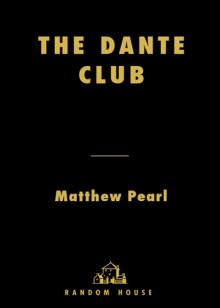 The Dante Club
The Dante Club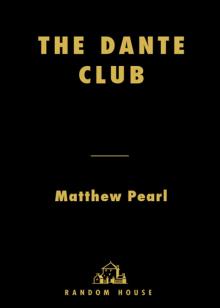 Dante Club
Dante Club The Poe Shadow
The Poe Shadow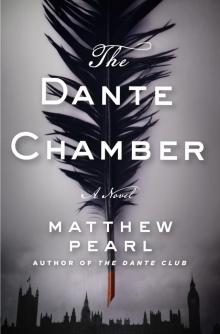 The Dante Chamber
The Dante Chamber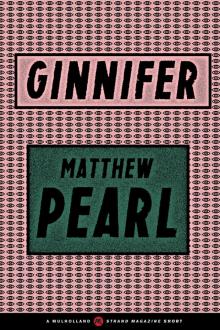 Ginnifer
Ginnifer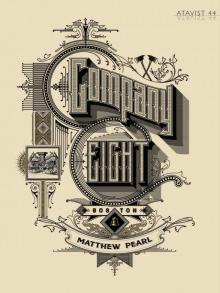 Company Eight
Company Eight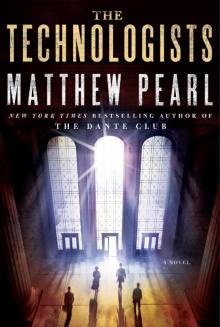 The Technologists
The Technologists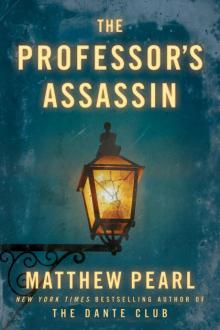 The Professor's Assassin
The Professor's Assassin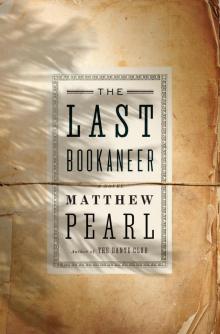 The Last Bookaneer
The Last Bookaneer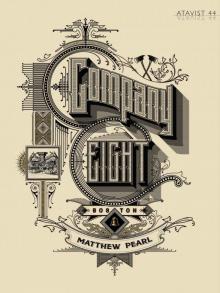 Company Eight (Kindle Single)
Company Eight (Kindle Single)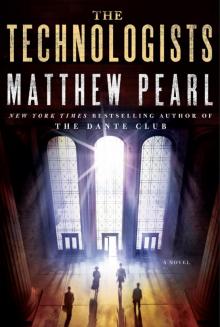 The Technologists: A Novel
The Technologists: A Novel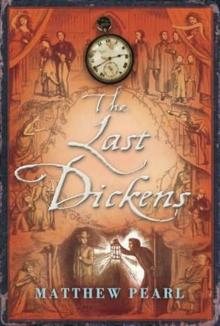 The Last Dickens
The Last Dickens